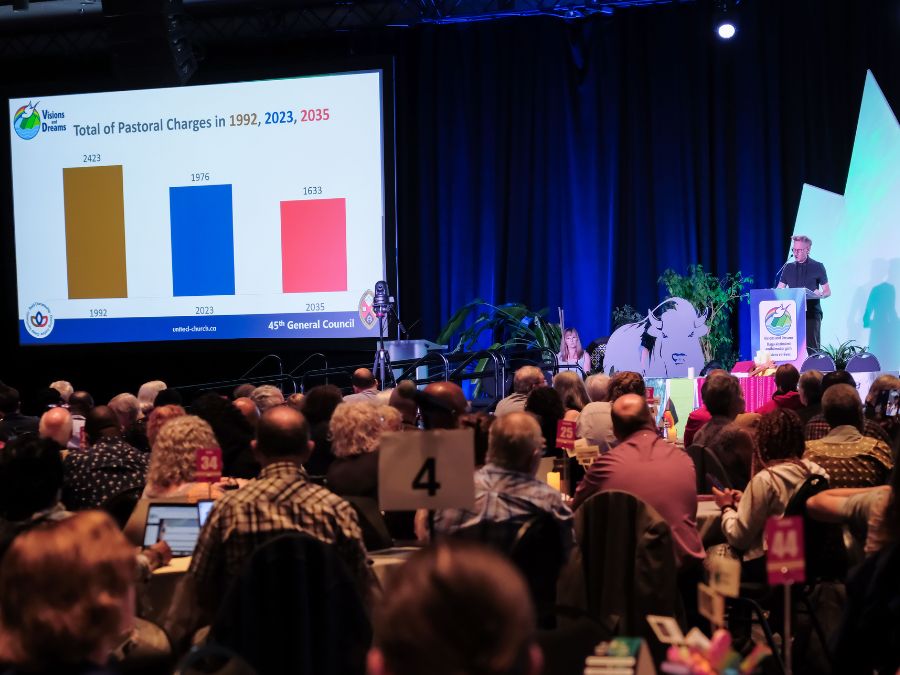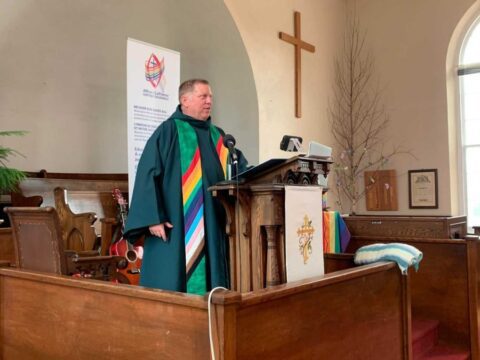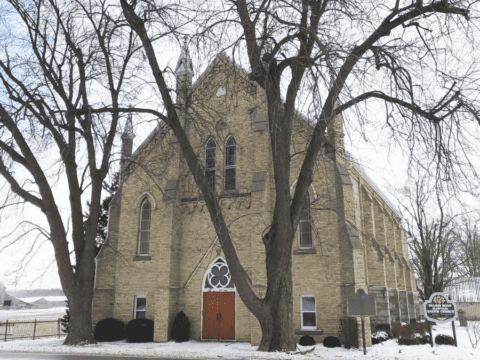At General Council 45 on Sunday, the United Church painted a dim picture of its future 10 years from now.
In a presentation, Cameron Fraser, director of growth and ministry development, told commissioners that in 2035, the United Church would likely have only 111,000 members — a 65 percent drop from 321,054 members in 2023.
You may unsubscribe from any of our newsletters at any time.
By 2035, there could be only 8,174 attending Sunday worship, a massive drop from 110,877 in 2023. Identifiable givers could number 46,959, an enormous loss from 149,909 in 2023. Participation in Sunday school will likely fall to 2,554, from 18,048 in 2023.
Fraser said that pastoral charges are not declining quite as dramatically. There were 1,976 in 2023, predicted to fall to 1,633 in 2035. “A very different marker of change than in the other data points,” he said.
“It means that somewhere along the line in this next couple of years, we are likely hitting a pivot moment where the collective expressions of pastoral charges is going to catch up to the decrease in individual participation. And the concern there is that this could leave tremendous swaths of the country without a United Church presence,” Fraser continued.
The United Church hired an outside firm to conduct this research as part of its Toward 2035 plans, a data-informed, long-term strategy to equip the church for the future. A motion that commissioners passed on Monday calls Toward 2035 a “sharpening” of its current strategic plan.
The motion encourages the wider church to experiment with new ministry projects, an extension of the permission that was granted at General Council 44 in 2022, and added the General Council as another place to experiment.
A focus on growth was a key tenet of the strategic plan, particularly growth in migrant church communities. The plan was originally created to guide the church’s work from 2022-2025.
The Toward 2035 effort “envisions a future where the United Church thrives through a strong denominational identity characterized by cooperation and collaboration, better reflecting the diversity of Canadian communities,” according to a May press release from the denomination. “It aims to foster resilient and inspired communities of disciples, accompanied by adaptive and effective ministry leaders, less burdened by property and governance requirements.”
Fraser said that the problem isn’t just about the simple decline in number of congregations — it’s that the United Church has something unique to offer.
“It’s not that we once had more franchises than Tim Hortons, and we really liked being able to say that, and now we’re worried we’re only going to be able to say there’s more franchises than Robin’s Donuts,” Fraser said on Sunday, citing the coffee shop with more than 70 franchises in seven provinces.
More from General Council 45:
- United Church apologizes to 2SLGBTQIA+ people in moving service
- Kimberly Heath elected as United Church’s next moderator
“But as our opening slides reminded us, we believe we have been called by God to be in a particular way of service to our communities. To be repairers of breaches, to be the face of a loving God holding hands out to a hurting world,” he said.
To that end, the bleak numbers were followed by presentations from communities of faith sharing positive stories about new experiments, including one pastoral charge that is using a new staff and ministry personnel-sharing model to save costs, reduce stress on ministers and enhance collaboration. Several commissioners who heard the examples said they felt encouraged.
“I need to just come almost and share how excited I felt by our speakers and inspired and wished that I were 40 again so I could get in there even though it’s tough,” said Very Rev. Gary Paterson, former moderator and a commissioner from Pacific Mountain Region, who is in his mid-70s.
Rev. Jennifer Henry, the General Council’s executive minister for organizational development and strategy, also urged everyone in the church to get involved in Toward 2035.
“This work of developing a whole church strategy towards that inspired, resilient communities of disciples — diverse, multi-generational, coast to coast to coast — is each and every one of our responsibilities, and we need to find our place in that journey and in that Jesus movement.”
Henry described several tools the national office is working on to help regions and congregations in their work. These include: making more data accessible to regions to assist them with strategic decision-making; a plan to gather data on diversity within faith communities; a property inventory to determine “what buildings are strategic and important that we need to hold on to”; and ongoing work to reimagine the current strategic plan.
“We are putting the tools and resources in the service of this vision, as we really try to turn towards hope and realize that beautiful dream that we have in front of us,” Henry concluded.
CORRECTION: A previous version of this story misstated the number of Robin’s Donuts restaurants in Canada. This version has been corrected.
***
Gillian Steward is a journalist in Calgary.















“UCC in Focus” is depressing for year 2035. Do I read correctly: 1633 charges with 8174 attending on Sunday and 2554 in Sunday School? That’s an average of five people in each church and one child. Unreal and unsustainable. Are these numbers considered accurate?
I believe the larger congregations will get larger and the smaller congregations will get smaller…
I am saying there will be far less congregations …each of them viable
The challenge is to adopt a new paradigm as to what adhearance and membership in the UCC brand of Christianity must be about that is not fixed or representative of what the institutional UCC was in the past. That has and is changing rapidly. And it is our world with the legion of sad and toxic movements currently occupying ‘Centre Stage’ in many national configurations far and wide, that challenges us and makes it extremely difficult to confront and counteract. We must never forget that Jesus of Nazareth didn’t give a damn about institutional religion of his day … he lived and based his entire life and message on another notion of community and faithfulness. That cost him his life. So now it is abundantly clear that followers of his Way must totally adopt and incarnate another way for us to live in community and celebrate the Spirit – seen and not seen – calling us forward. Are we capable of such a strategy? The ‘jury is still out’!
Your comment is one of the reasons why the UCC is dwindling down to nothing. You can’t even give a clear reason as to who Christ is, leave alone His purpose. Secondly it’s ironic that for 2000 years the Gospel worked, but in the last 30 or so we’re trying to change it to make it fit the culture. Christ is counter culture.
Something that might give the United Church more visibility is an addition to the name.” “United” is bland and easily confused with other entities. A more colourful and evocative word that is meaningful to newcomers to Canada might be appealing. No, I can’t think of one right now but maybe we can all think about it.
I thought of one. United Church of Christ, Canada.
Church leadership has to define what the UCC uniquely offers.
the Gospel interpreted as Social Gospel theology — or political theology — has pretty much run its course. What is to replace it?
How about a Holy God who cannot tolerate imperfection in anyway, gave an alternative for sinful man to have fellowship with Him? The other alternative is eternal separation from God. If God is the source of all things created, that would mean separation from all things. (Christ called that eternal punishment.) 1 Corinthians 15:1-6 gives the true Gospel that the UCC should uniquely offer.
I am in my 30s and here is my thought: why is every church group and service geared toward retired people during the day? That’s not bad for those folks, but I work full-time. Where is the evening or weekend bible study group? Where is the adult meetup/study groups? (again on weekends of evenings). I want to engage but the UCC is stuck in the traditional Sunday service format. That’s awesome, but I don’t resonate that way and I know lots of people like that. Different people have different needs for worship and connection, I think looking there might help the UCC re-engage.